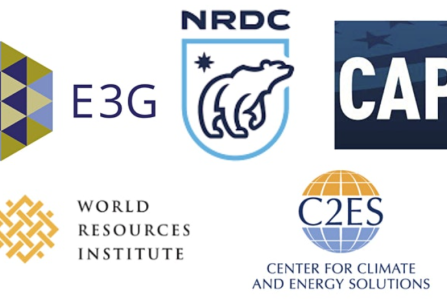
19 November 2021
On 18 November 2021, Transatlantic Climate Bridge partner E3G hosted the virtual expert panel “COP26 – What are the main takeaways and how will it change US climate diplomacy?” Speakers discussed the relative effectiveness of COPs and whether UN-headed multilateral climate governance is moribund, the importance of private and philanthropic finance in “keeping 1.5 alive,” Glasgow’s emphasis on better incorporating the topic of environmental degradation into Conferences’ typically climate-dominated conversations, and whether the Glasgow Climate Pact sounds the death knell for coal or re-entrenches it in the global energy economy. The event's panel consisted of Manish Bapna, NRDC President and CEO; Nat Keohane, C2ES President; Helen Mountford, WRI Vice President, Climate Economics; John Podesta, CAP Founder and Chair of the Board of Directors; Nick Mabey, E3G Co-Founding Director and CEO; and was moderated by Claire Healy, E3G Director, Washington, DC.
Mabey made clear that, although COP summits are messy and often fall short of delivering the publicly hyped, society-wide transformations they set out to achieve, they succeed in creating momentum—a feat that should not so easily be discounted. Mountford echoed Mabey’s sentiment, stressing the continued importance of COPs as global norm-setters and the only institutional fora where world leaders, civil society, the private sector, and public figures can congregate to establish goals toward achieving impactful (albeit dangerously staggered) climate action. COP26 witnessed remarkable progress, despite the reappearance of all-too-familiar last-minute textual amendments—this year forced by China and India. According to Bapna, however, rephrasing the term “phase-out” to “phase-down” in the Climate Pact’s coal clause will likely prove arbitrary, as even with this change, India’s coal emissions could decrease by as much as 50% by 2030. Given the India's abiding concern about its greenhouse gas (GHG) reduction obligations under Paris’ Common but Differentiated Responsibilities framework, Bapna suggested that the country needed a platform they could push in national and subnational politics. Panellists agreed that it remains unclear how China will meet its Nationally Determined Contribution (NDC).
Toward the event's conclusion, speakers discussed how America’s ability to maintain its already tenuous position in transatlantic climate diplomacy hinges on Congressional adoption of the Build Back Better Act, which could transform the country’s energy profile. If the Act—which recently passed the House of Representatives—dies in the Senate, “US credibility in keeping 1.5 alive is busted,” commented Podesta. Currently, the US is not equipped to achieve its 50-52% GHG reductions target due to the nontrivial gap between the country's climate ambitions and the deliverables outlined in its NDC; however, Build Back Better could change that. For now, as the legislation hangs in Senate purgatory, advocates of the Act cling to a modicum of hope.
